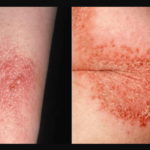Eczema is a common skin condition that affects millions of people worldwide. It is characterized by dry, itchy, and inflamed skin, which can be painful and uncomfortable. While there is no cure for eczema, there are many ways to manage the symptoms, including diet and nutrition.
Research has shown that certain foods can trigger eczema flare-ups, while others can help to alleviate symptoms. For example, foods high in histamine, such as aged cheeses, fermented foods, and alcohol, can cause itching and inflammation in some people with eczema. On the other hand, foods that are high in anti-inflammatory compounds, such as omega-3 fatty acids, can help to reduce inflammation and improve skin health.
By making simple changes to their diet, people with eczema can potentially reduce the severity and frequency of their symptoms. This article will explore the relationship between food and eczema, and provide tips and strategies for incorporating eczema-friendly foods into a healthy and balanced diet.
What is Eczema?

Eczema is a skin condition that causes red, itchy, and inflamed patches of skin. It is also known as atopic dermatitis and is a chronic condition that affects millions of people worldwide. The exact cause of eczema is unknown, but it is believed to be a combination of genetic and environmental factors.
People with eczema have a weakened skin barrier, which makes it easier for irritants and allergens to penetrate the skin and cause an immune response. This immune response leads to inflammation and itching, which can be uncomfortable and can interfere with daily activities.
Eczema can affect people of all ages, but it is most common in infants and young children. It often improves as children grow older, but some people continue to have eczema into adulthood. Certain foods, stress, and environmental factors such as dry air or exposure to harsh chemicals can also trigger eczema.
Foods that Trigger Eczema
Eczema is a chronic skin condition that causes inflammation, dryness, and itching. While there is no known cure for eczema, avoiding certain foods can help manage the symptoms. Here are some foods that have been known to trigger eczema:
- Dairy products: Milk, cheese, and yogurt can cause eczema flare-ups in some people. This is because dairy contains casein and whey, which are proteins that can cause an allergic reaction.
- Eggs: Like dairy, eggs are a common allergen that can trigger eczema. Some people with eczema may also be allergic to the proteins found in egg whites.
- Gluten: Gluten is a protein found in wheat, barley, and rye. Some people with eczema may have a gluten intolerance or celiac disease, which can cause eczema symptoms to worsen.
- Soy: Soy is another common allergen that can trigger eczema. It is often found in processed foods, so it is important to read labels carefully.
- Tomatoes: Tomatoes are a nightshade vegetable that can cause eczema flare-ups in some people. Other nightshade vegetables include potatoes, eggplants, and peppers.
It is important to note that not everyone with eczema will be triggered by these foods. Each person’s triggers are unique, and it may take some trial and error to determine which foods worsen symptoms. Keeping a food diary can help identify potential triggers and make it easier to manage eczema symptoms.
Foods that May Help with Eczema
While there is no cure for eczema, some foods may help alleviate symptoms. Here are a few foods that may help:
- Probiotics: Probiotics are good bacteria that can help improve gut health. Some studies suggest that taking probiotics may reduce eczema symptoms.
- Fatty Fish: Fatty fish, such as salmon, mackerel, and sardines, are rich in omega-3 fatty acids. Omega-3s can help reduce inflammation, which may help alleviate eczema symptoms.
- Leafy Greens: Leafy greens, such as spinach and kale, are rich in vitamins and minerals that can help support overall health. Some studies suggest that consuming leafy greens may help reduce the risk of eczema.
- Quercetin-Rich Foods: Quercetin is a flavonoid that has anti-inflammatory properties. Foods that are rich in quercetin include apples, onions, and berries.
It’s important to note that while these foods may help alleviate eczema symptoms, they should not be used as a substitute for medical treatment. Anyone with eczema should consult with their doctor before making any dietary changes.
Other Dietary Considerations for Eczema

While avoiding trigger foods is important, other dietary considerations can help manage eczema symptoms:
- Omega-3 fatty acids: Foods rich in omega-3 fatty acids, such as fatty fish, flaxseed, and chia seeds, have anti-inflammatory properties that may help reduce eczema symptoms.
- Probiotics: Probiotics, found in fermented foods like yogurt and kefir, may help improve gut health and reduce inflammation, which can benefit eczema sufferers.
- Water intake: Staying hydrated is important for maintaining healthy skin. Drinking plenty of water can help keep the skin moisturized and reduce eczema flare-ups.
Maintaining a balanced and varied diet is important, as nutrient deficiencies can worsen eczema symptoms. Eating a variety of fruits, vegetables, whole grains, and lean protein sources can help ensure that the body is getting all the nutrients it needs.
Additionally, some people with eczema may benefit from avoiding foods high in histamines, such as aged cheeses, cured meats, and fermented foods. Histamines can trigger allergic reactions and inflammation in some people, which can worsen eczema symptoms.
Overall, while there is no one-size-fits-all diet for eczema, incorporating these dietary considerations can help manage symptoms and improve overall skin health.
Conclusion
While there is no definitive cure for eczema, there are a few dietary changes that may help alleviate symptoms. Avoiding foods that trigger inflammation and consuming foods that are rich in vitamins, minerals, and antioxidants can help improve overall skin health and reduce the severity of eczema flare-ups.
Some people have found success in eliminating dairy, gluten, and processed foods from their diets. However, it’s important to note that these dietary changes may not work for everyone, and it’s always best to consult with a healthcare professional before making any drastic changes to your diet.
Additionally, incorporating foods that are high in omega-3 fatty acids, such as salmon, flaxseeds, and walnuts, can help reduce inflammation in the body and improve skin health. Other foods that may be beneficial for eczema sufferers include leafy greens, berries, and probiotics.
It’s important to remember that while diet can play a role in managing eczema symptoms, it’s not a replacement for medical treatment. If you are experiencing severe eczema symptoms, it’s essential to seek medical attention to determine the best course of treatment for your needs.









